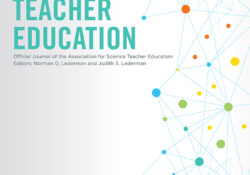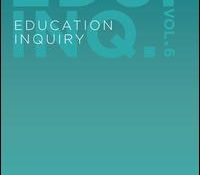eric.ed.gov har udgivet: This program evaluation assessed the utility and efficacy of lead4ward toward facilitating meaningful instructional planning, and improving STAAR reading, English language arts, and math performance of students whose teachers participated in lead4ward professional development. A web-based survey on HISD’s HUB yielded responses from 340 educators who had direct exposure to lead4ward. The highest percentages of respondents found that lead4ward was closely aligned to TEKS (87.1). In addition, 79.0% of respondents indicated that they used lead4ward in grade level, developmental planning, and PLCs meetings. Nearly 70.0% of respondents noted that the Field Guides were helpful in planning and implementing lessons well (69.8%). Respondents found that lead4ward resources improved proficiency among students “more than a little” in mathematics, English language arts/reading, science, social studies, teacher induction, and intervention/RTI. Instructional… Continue Reading →
Like this:
Like Loading...

tandfonline.com har udgivet en rapport under søgningen “Teacher Education Mathematics”: ABSTRACT ABSTRACT Successful use of ICT in the classroom requires thoughtful integration of technology and pedagogical processes during lesson preparation. This study investigated whether the information format of technological and pedagogical support affects pre-service teachers’ technology integration in lesson plans. One group of pre-service teachers (n = 37) received support materials that presented technological, pedagogical and content information separately; another group (n = 36) received a version of these materials in which the technological and pedagogical information was integrated. Pre-service teachers used these support materials to create a technology-infused lesson plan. As expected, the pre-service teachers who received integrated support had relatively more design justifications in which technology and pedagogy were combined than their peers from the separate support group.… Continue Reading →
Like this:
Like Loading...
eric.ed.gov har udgivet: Science education reform standards have shifted focus from exploration and experimentation to evidence-based explanation and argumentation to prepare students with knowledge for a changing workforce and critical thinking skills to evaluate issues requiring increasing scientific literacy. However, in urban schools serving poor, diverse populations, where the priority is on students’ assessment results in reading and math, students may not receive reform-based science. The rationale for this qualitative study was to examine how two elementary teachers from high-poverty urban schools planned for reform-based science in response to a quality state science assessment in conjunction with their training and resources. Their state assessment included an inquiry task requiring students to construct responses to questions based on their investigation data. From evaluating evidence using Zembal-Saul’s continuum for teaching science as… Continue Reading →
Like this:
Like Loading...
tandfonline.com har udgivet en rapport under søgningen “Teacher Education Mathematics”: ABSTRACT ABSTRACT Although microteaching is a common approach to engaging preservice teachers in reflection on teaching in on-campus courses, this reflection is usually carried out as a separate part. We examined how preservice middle school science teachers reflected amid planning a 20-min microteaching unit on sustainable development. Six groups of preservice teachers were video recorded and their conversations transcribed. We used practical epistemology analysis to analyze moments of reflection in these conversations. The preservice science teachers recurrently engaged in reflection in the course of their planning, which led to changes in perspective concerning important aspects of how to plan teaching that may be considered central for preservice science teachers to learn during their teacher education. Preservice teachers’ reflection was related… Continue Reading →
Like this:
Like Loading...
eric.ed.gov har udgivet: Planning is an essential part of teachers’ work that has consequences for students’ learning. However, previous research shows that what it means to plan vary. To explore the meaning of planning from teachers’ point of view, and to open up for planning as a situated and emotional process, an interview study with Swedish mathematics teachers was conducted. In the analysis, the theoretical concepts, meaning, and emotions were used as analytical tools to fill the gap identified in the review of previous research about planning. Findings reveal planning as a varied process in which teachers draw on different resources. Actors other than teachers influence both how planning is done and the mathematics teaching that is planned for. Findings also reveal that feelings, such as joy, shame, and insufficiency,… Continue Reading →
Like this:
Like Loading...
tandfonline.com har udgivet en rapport under søgningen “Teacher Education Mathematics”: ABSTRACT ABSTRACT Children in foster care may face difficulties during their school years. When it comes to academic achievement, there is reported low school performance and lower grades. However, school may be strong protective factor in difficulties if supports are individual. School-based interventions represent a possibility for supporting children whose home life may make them vulnerable. This discussion paper presents Finnish initiative, which is based on Skolfam® model used in several Nordic countries. Link til kilde
Like this:
Like Loading...
eric.ed.gov har udgivet: This resource is part of a series produced by the Center for Standards and Assessment Implementation (CSAI) to assist teachers and those who support teachers to plan teaching and learning from College and Career Ready Standards (CCRS) for all students, including students with disabilities, English learners, academically at-risk students, students living in extreme poverty, and gifted/talented students. The series of resources addresses key shifts in learning and teaching represented in the CCRS. This resource uses the Common Core State Standards (CCSS; National Governors Association Center for Best Practices, Council of Chief State School Officers, 2010) as an example of CCRS. The processes described in this resource are applicable to all States’ CCRS, including the CCSS. The content of this resource is drawn from leading theory and research… Continue Reading →
Like this:
Like Loading...
eric.ed.gov har udgivet: This resource is part of a series produced by the Center for Standards and Assessment Implementation (CSAI) to assist teachers and those who support teachers to plan teaching and learning from College and Career Ready Standards (CCRS) for all students, including students with disabilities, English learners, academically at-risk students, students living in extreme poverty, and gifted/talented students. The series of resources addresses key shifts in learning and teaching represented in the CCRS. This resource uses the Common Core State Standards (CCSS; National Governors Association Center for Best Practices, Council of Chief State School Officers, 2010) as an example of CCRS. The processes described in this resource are applicable to all States’ CCRS, including the CCSS. The content of this resource is drawn from leading theory and research… Continue Reading →
Like this:
Like Loading...


